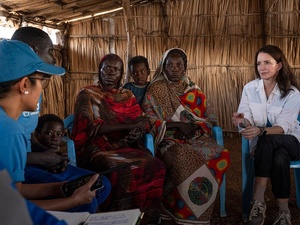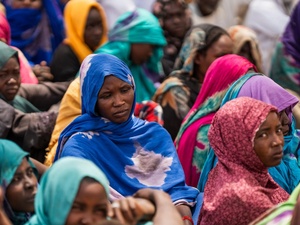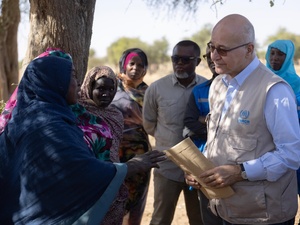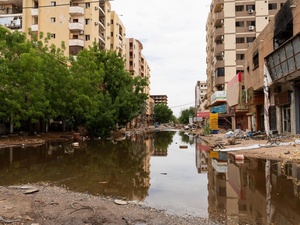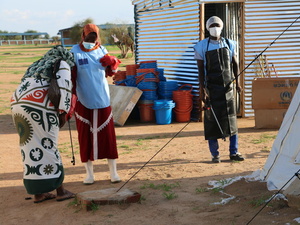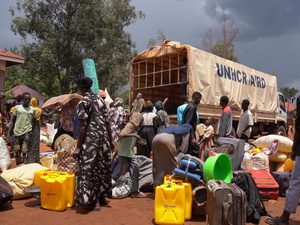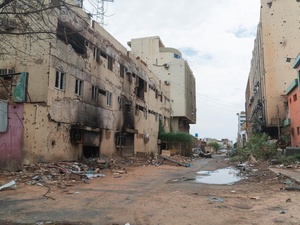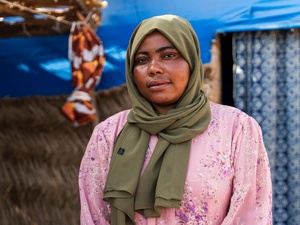Chad/Sudan: "invisible emergency" still of extreme concern
Chad/Sudan: "invisible emergency" still of extreme concern
The number of refugees fleeing Sudan's western Darfur region into neighbouring eastern Chad is now estimated at 95,000 - some 30,000 of them in December alone. You may recall I recently referred to this situation as an example of an "invisible emergency." It's still going on and it's still of extreme concern to us. The Sudanese refugees are scattered in dozens of makeshift settlements that have sprung up along a 600-km stretch of remote, insecure borderland between the two countries. They are subjected to periodic raids by bandits and marauding militias from across the border, and many are in dire need of assistance. This makes it all the more urgent that a UNHCR relocation operation aimed at moving them to safer sites further inland begin as soon as possible.
UNHCR emergency staff in eastern Chad are now preparing for the logistically difficult relocation operation, which is tentatively set to begin on January 15. The UNHCR team reported this morning from our eastern Chad office in Abéché that the first of the new inland camps, Farchana, should be ready to begin accepting an initial population of up to 9,000 refugees in about 10 days. The Farchana site is 55 km from the border and is being hurriedly prepared by our German partner, GTZ, which is digging wells and building latrines and showers. Médecins Sans Frontières Holland will be in charge of water treatment. UNHCR has 2,000 tents in Abéché, the first of which are already being erected in Farchana. Other sites are also being identified in the Adré and Guéréda areas.
Meanwhile, UNHCR and its NGO partners are carrying out an emergency distribution of food and non-food items to some of the most vulnerable refugees still encamped along the insecure border. This is extremely difficult given the security concerns, the remoteness of the region and the logistical constraints involved in covering such a wide area. The first phase of the emergency distribution began on Friday in the Birak, Senette and Feguerra areas in Birak Canton, along the northern stretches of the affected border zone. As of yesterday, aid supplies had been provided to 13,250 of the most vulnerable refugees, many of them women and children. The refugees received blankets, mats, jerry cans and some food, including cooking oil and sorghum.
UNHCR staff involved in the distribution said the provision of food was essential because some of the refugees had been forced to sell blankets and other possessions, including previously distributed aid items, to feed their families. Although hot during the day, temperatures can plunge to less than 10ºC. at night. Most of the refugees are women and children and usually arrive at the border on foot following continuing raids by militia groups on villages across the strife-torn Darfur region of western Sudan. They report that the militia raids are marked by widespread looting and stealing of livestock, sending panicked villagers fleeing on foot toward the border with Chad. Most of the refugees travel by night and in small groups to avoid attention
Many of the refugees are living in flimsy, makeshift shelters constructed with whatever materials they can find. Yesterday, UNHCR staff in our eastern Chad headquarters at Abéché - 850 km east of N'Djamena - were on hand to welcome a much-needed Unicef air shipment of 22,000 blankets, nearly 3,000 of which were immediately dispatched in UNHCR trucks for distribution in the Djoran area beginning tomorrow (Wednesday). This second emergency distribution will focus on 13,500 vulnerable refugees in the Djoran and Guimeze areas.
The relocation operation scheduled to begin mid-month will involve transporting the refugees to the new Farchana camp in UNHCR and GTZ trucks. Relocation movements will take place daily. Upon arrival, the refugees will go through a reception process that will include formal registration, medical screening, allocation of a family site and the provision of blankets, mats, soap, jerry cans and food.
The latest UNHCR emergency team, the third to deploy to Chad in the past year, arrived in Abéché on Saturday and will bolster UNHCR staff already working in the eastern border area.


